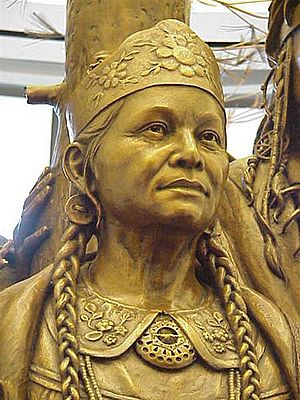Polly Cooper facts for kids
Polly Cooper was a brave woman from the Oneida Nation in New York. In 1777, she helped the American soldiers during the American Revolution. These soldiers, called the Continental Army, were struggling at Valley Forge, Pennsylvania during a very cold winter.
Helping the American Soldiers
Polly Cooper and other Oneida people walked hundreds of miles. They carried lots of white corn to the hungry Continental Army. Polly stayed with the soldiers for a while. She taught them how to cook the white corn properly. This was important so the soldiers could digest it well. She also helped by sharing herbal medicines and providing medical care.
Why the Oneida Helped
The Oneida Indian Nation had a good relationship with George Washington and his army. This friendship was important to Polly Cooper's story. The Oneida Nation supported the American cause. This was partly because of a preacher named Samuel Kirkland. They also disliked the British leaders, Sir William Johnson and Guy Johnson. On April 25th, a group of 47 Oneida men and Polly Cooper left with Louis de Tousard. They carried many bushels of corn to help Washington's army at Valley Forge.
After the War
After the war ended, the Continental Army wanted to pay Polly Cooper for her brave service. But she said no to any payment. She believed it was her duty to help her friends when they needed it.
However, Cooper really liked a black shawl she saw in a store window. So, the American Congress set aside money to buy the shawl for her. It was given to her for her help as a cook for the army officers. This special shawl is still cared for by Polly Cooper's family today. It is in very good condition. Sometimes, it is shown at the Shako:wi, The Oneida Nation Cultural Center.
Remembering Polly Cooper
There is a group called the Polly Cooper Chapter of the National Society Daughters of the American Revolution. It is located in Chappaqua, New York.
In 2004, the Oneida Indian Nation asked a sculptor named Edward Hlavka to create a bronze statue. This statue helps share the stories about Polly Cooper that have been passed down through generations. The statue is 22 feet tall and weighs 2,200 pounds. It was given to the Smithsonian Institution's National Museum of the American Indian. You can see it on the Oneida floor there. In 2005, Polly Cooper was added to the Hall of Fame of the Oneida County Historical Society.
 | Georgia Louise Harris Brown |
 | Julian Abele |
 | Norma Merrick Sklarek |
 | William Sidney Pittman |


